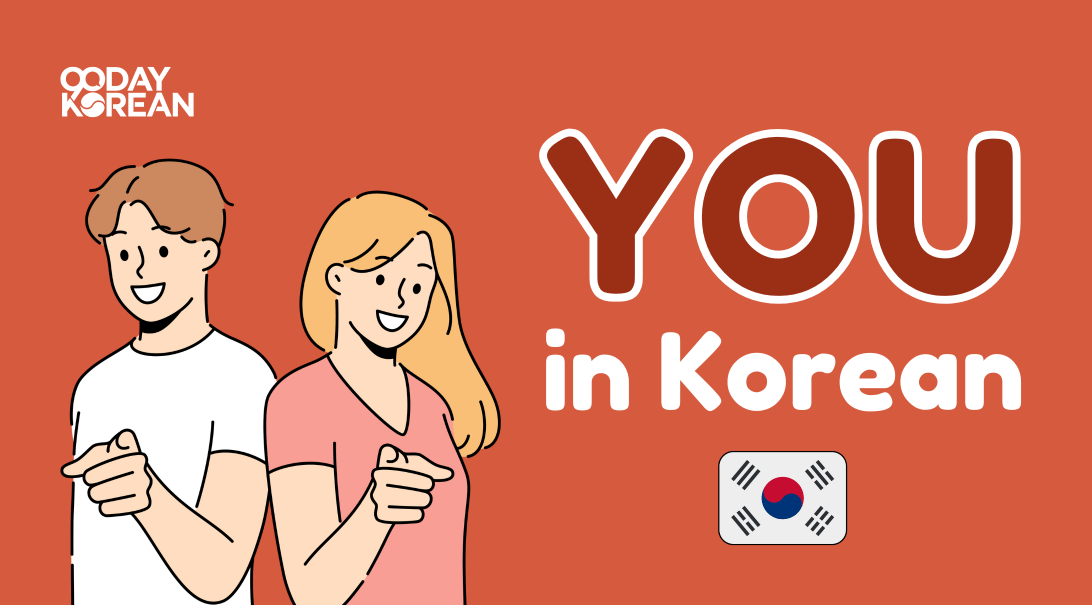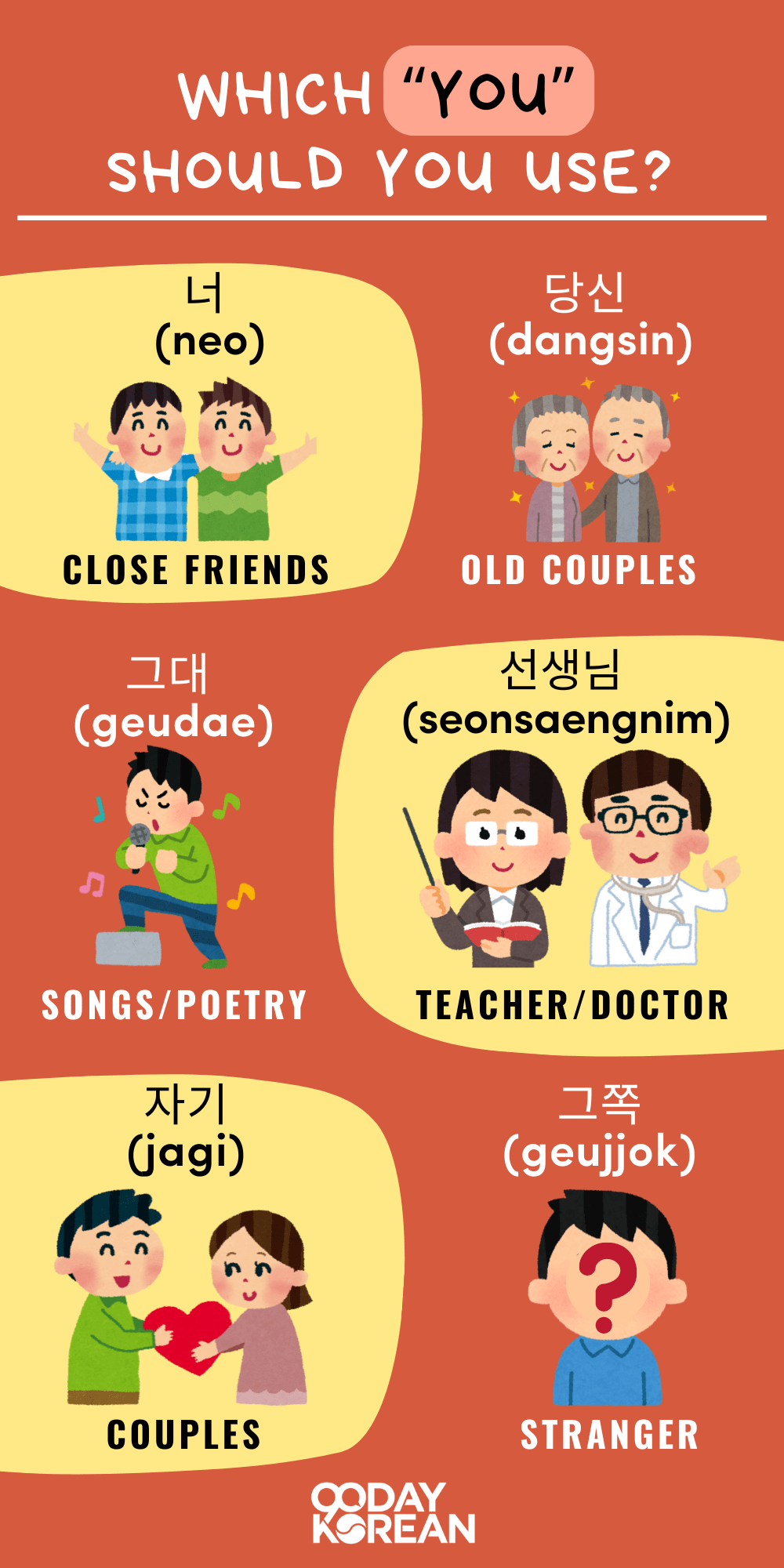Interested in the way to say “you” in Korean? The principle phrase for “you” is 너 (neo) for casual conditions and 당신 (dangsin) for formal contexts.
Nonetheless, these phrases are usually not used the identical method as “you” in English. 너 (neo) is frequent in on a regular basis informal speech, whereas 당신 (dangsin) is never utilized in conversations and might sound confrontational or intimate. We’ll clarify extra about this under.

On this article, we’ll cowl alternative ways to say “you” in Korean, with sensible examples and utilization ideas.
Fast Abstract
- ✅The 2 frequent methods to say “you” in Korean are 너 (neo), which is casual, and 당신 (dangsin), which is formal however sparingly used.
- ✅In formal or well mannered speech, Koreans favor to make use of the individual’s identify, title, or relationship phrases for a extra respectful and applicable communication, moderately than utilizing “you.”
- ✅Different much less frequent phrases for “you” embrace 그대 (geudae) for poetic contexts and 자네 (jane) in additional dated or regional utilization.
Is there a Korean phrase for “you?”
Sure, there’s. The casual phrase for “you” is 너 (neo), and the formal phrase is 당신 (dangsin). Nonetheless, 당신 (dangsin) is much less frequent than 너 (neo). There are additionally different phrases that imply “you,” resembling 그대 (geudae) and 자네 (jane).
Easy methods to say “you” in Korean
In Korean, the way you say “you” will depend on how formal or acquainted the scenario is. 너 (neo) is used informally, whereas 당신 (dangsin) is extra formal and fewer frequent, usually utilized in writing or between married {couples}.
In well mannered on a regular basis dialog, Koreans usually favor utilizing the individual’s identify or title moderately than immediately utilizing “you.”
Other ways to say “you” in Korean
In Korean, there are alternative ways to say “you,” and utilizing them accurately is necessary for well mannered communication. Listed here are some frequent methods and when to make use of them:
너 (neo)
너 (neo) is “you” that’s utilized in casual speech. You need to use this to shut mates or somebody who’s youthful than you. It’s best to keep away from utilizing it in formal or skilled settings as it may be seen as disrespectful.
Instance:
When asking what your buddy is as much as:
너 지금 뭐해? (neo jigeum mwohae?)
What are you doing now?
당신 (dangsin)
당신 (dangsin) is the formal model of 너 (neo). Whereas 너 (neo) is frequent in on a regular basis speech, 당신 (dangsin) isn’t. 당신 (dangsin) is commonly utilized in written language, songs, or poetry and will be intimate or confrontational when utilized in talking.
It’s a time period used between spouses, normally outdated {couples}. As a result of its sturdy tone, it must be used with warning in direct dialog.
Instance:
A husband speaking to his spouse:
당신이 내 아내라서 정말 행복해. (dangsini nae anaeraseo jeongmal hangbokhae.)
I’m so completely satisfied that you’re my spouse.
A heated argument the place somebody is blamed:
당신 때문에 일이 이렇게 됐어요! (dangsin ttaemune iri ireoke dwaesseoyo!)
Due to you, issues turned out like this!
In these examples, 당신 (dangsin) can convey completely different feelings based mostly on the scenario. When used intimately, it may present deep affection and closeness. However in arguments, it may emphasize blame or dissatisfaction, making it sound extra direct and aggressive.
그대 (geudae)
A poetic type of “you,” usually present in songs, poetry, or romantic language, although not often utilized in day by day dialog.
Instance:
In a music:
그대는 나의 모든 것 (geudaeneun naui modeun geot)
You are my every little thing.
선생님 (seonsaengnim)
This can be a respectful title used for academics or different revered professionals resembling docs, not directly serving as “you” in formal interactions. That is usually used as a generic respectful title past the classroom setting.
Instance:
To a trainer:
선생님께 드리는 선물이에요. (seonsaengnimkke deurineun seonmurieyo)
It’s a present for you.
선생님 덕분에 잘 지냈습니다. (seonsaengnim deokbune jal jinaetseumnida.)
Due to you, I’ve been effectively.
자기 (jagi)
An affectionate time period equal to “honey” or “babe.” That is used completely in an intimate context and isn’t applicable for formal or basic use.
Situation: Between {couples} or very shut relationships.
Instance:
Between companions:
자기, 뭐 먹고 싶어? (jagi, mwo meokgo sipeo?)
Honey, what do you wish to eat?
그쪽 (geujjok)
It’s extra well mannered than 너 (neo) however much less formal than utilizing titles or honorifics. It may be used whenever you wish to be well mannered however preserve a long way, resembling when talking to somebody you don’t know effectively.
Instance:
To a stranger in a crowded subway:
그쪽 먼저 가세요. (geujjok meonjeo gaseyo.)
You go first.
To somebody you don’t know effectively at a gathering:
그쪽은 어떻게 생각해요? (geujjogeun eotteoke saenggakaeyo?)
What do you assume?


What’s the well mannered technique to say “you” in Korean?
To politely say “you” in Korean, it’s greatest to keep away from utilizing pronouns immediately. As an alternative, Koreans usually use titles, names, or relationship phrases. If you have to use a pronoun, you should use “당신” (dangsin), however watch out as a result of it may typically sound too direct or intimate. Listed here are some well mannered methods to handle somebody:
- Use their first identify with 씨 (ssi), like 지나 씨 (Jina-ssi). If you recognize the individual’s first identify. 선생님 (seonsaengnim) means “trainer,” however it may be additionally used as a basic respectful title.
- Job titles with 님 (nim) like 부장님 (bujangnim) for “supervisor,” 감독님 (gamdoknim) for “director.”
- In service contexts, you may use 고객님 (gogaengnim), which implies “buyer.”
- 형님 (hyeongnim) can be utilized for males. It means “older brother” in a respectful tone. 누님 (nunim) can be utilized for females; it means “older sister” in a respectful tone.
Utilizing Titles Over Pronouns
As briefly lined above, Koreans normally favor utilizing an individual’s identify, title, or relationship phrases to be extra respectful moderately than utilizing “you” when addressing folks. Listed here are some examples:
이름 + 씨 (Identify + ssi)
By including 씨 (ssi) after an individual’s first identify, you may deal with somebody respectfully in an expert or social setting.
Instance:
In an workplace:
희진 씨가 이것 좀 도와주실래요? (hijin ssiga igeot jom dowajusillaeyo?)
Might you assist with this, Heejin?
지나 씨 언제 퇴근해요? (jina ssi eonje toegeunhaeyo?)
When do you get off work, Jina?
직함 + 님 (Title + nim)
It’s a very respectful, formal method of addressing somebody by their skilled title. This exhibits respect and recognition of their place.
Instance:
In a enterprise assembly:
부장님, 보고서 읽어보셨나요? (bujangnim, bogoseo ilgeobosyeonnayo?)
Supervisor, have you ever learn the report?
Within the office:
감독님 저를 부르셨나요? (gamdongnim jeoreul bureusyeonnayo?)
Director, did you name me?
고객님 (gogaengnim)
Instance:
고객님 성함이 어떻게 되세요? (gogaengnim seonghami eotteoke doeseyo?)
형님 (hyeongnim) / 누님 (nunim)
A respectful method of addressing an older brother or sister or somebody you respect, resembling an older sibling. It’s used to indicate respect in familial or shut social contexts.
Instance:
In a household gathering:
형님, 잘 지내셨어요? (Hyeongnim, jal jinaesyeosseoyo?)
Have you ever been effectively, outdated brother?
누님, 어디 가세요? (nunim, eodi gaseyo?)
Sister, the place are you going?
Frequent errors in utilizing phrases for “you” in Korean
Utilizing phrases for “you” in Korean will be difficult as a result of nuances of politeness and ritual within the language. Listed here are some frequent errors folks make and corrections.
Utilizing 너 (neo) in formal conditions
너 (neo) is casual and will be seen as disrespectful when addressing somebody of upper standing or in a proper scenario.
Correction: Use title + 님 (nim) or a respectful time period like 선생님 (seonsaengnim).
Overusing 당신 (dangsin) in conversations
Whereas 당신 (dangsin) is well mannered, it may sound confrontational or overly intimate. It’s usually reserved for written language or particular contexts like songs or poetry.
Correction: Use title or identify + 씨 (ssi) as an alternative, or keep away from pronouns altogether.
Ignoring Titles and Honorifics
Titles and honorifics present respect and acknowledge the social hierarchy. If not utilizing applicable titles or honorifics when addressing somebody, it may sound impolite.
Correction: Be taught and use the suitable title or honorific for the individual you might be talking to, resembling 선생님 (seonsaengnim) for a trainer or 기사님 (gisanim) for a driver.
Not Adjusting for Age and Social Standing
Utilizing the identical type of “you,” whatever the different individual’s age or social standing, can be a standard mistake. Korean tradition locations a powerful emphasis on age and hierarchy, and failing to regulate your language will be seen as impolite.
Correction: At all times think about the age and social standing of the individual you might be addressing and select your phrases accordingly.
Misusing 그대 (geudae)
It’s a poetic or literary time period and might sound overly dramatic or inappropriate in informal or formal speech.
Correction: You need to use 그대 (geudae) for creative or poetic contexts and use extra normal phrases in on a regular basis dialog.
Understanding these nuances and being aware of context will assist you use the suitable type of “you” in Korean, guaranteeing that you simply talk respectfully and successfully.
What to do after studying about “you” in Korean
After studying “you” in Korean, you may think about increasing your Korean language expertise by exploring these further assets:
- Korean Pronouns – Study different private pronouns that can be utilized alongside “you.”
- Korean Demonstrative Pronouns – Discover ways to categorical pronouns like “this,” “that,” “right here,” and “there.”
- Korean Possessive Pronouns – Discover ways to speak about issues that you simply personal utilizing the pronouns “my,” “mine,” and extra.
Incessantly Requested Questions (FAQs)
Listed here are different questions associated to saying “you” in Korean.
Can I take advantage of 당신 with strangers?
당신 (dangsin) is never used when speaking to strangers, it’s higher to keep away from it. You need to use different phrases like 선생님 (seonsaengnim) to indicate respect or a impartial phrase like 그쪽 (geujjok).
Can I take advantage of 너 (neo) with anybody I meet? Is it okay to make use of 너 with mates?
No, 너 (neo) is casual and may solely be used with folks you might be very near, resembling mates of the identical age or youthful folks in casual settings. Keep in mind, it’s thought of impolite to make use of 너 with elders, superiors, or in any formal scenario.
Why do Koreans keep away from utilizing “you”?
To indicate respect and politeness in dialog, Koreans keep away from utilizing “you” on to acknowledge social hierarchy. As an alternative, they use titles, names with honorifics, or relationship phrases. This helps preserve politeness and applicable social distance.
Conclusion
As we wrap up, we discovered that saying “you” in Korean relies upon quite a bit on how formal you have to be and your relationship with the individual. Koreans usually keep away from direct pronouns and as an alternative use titles, names with honorifics, or relationship phrases to indicate respect.
It’s necessary to make use of these types accurately to speak respectfully in Korean. For instance, 너 (neo) is okay to make use of in informal settings, however 당신 (dangsin) must be used fastidiously as a result of it may sound sturdy. As an alternative, utilizing phrases like 선생님 (seonsaengnim), 그쪽 (geujjok), or names with 씨 (ssi) in social conditions are frequent and well mannered methods to handle somebody.
Do you could have any questions or ideas about the way to say “you” in Korean? Share them within the feedback under!
Was this submit useful?
SureNo

